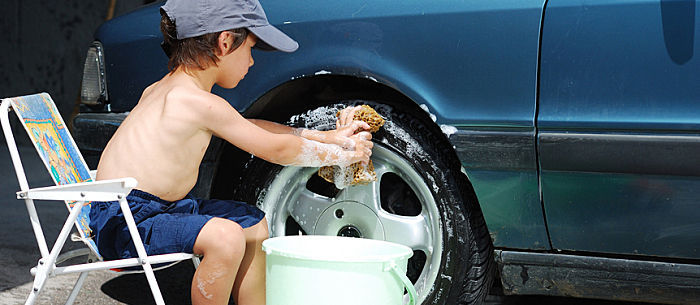Setting a list of age-appropriate chores for kids to complete each week is a great way to teach them about responsibility. Whether they’re extra pocket money jobs or simply a way for your kids to earn their keep, chores will give children an invaluable set of life skills essential for when they’re older. The only question that a lot parents face is how to motivate their children.
The two ways to inspire your children to do their chores are by:
- making sure the chores are age appropriate… and
- giving them rewards and positive reinforcements
Here are a few pointers to have children of any age help out at home:
Toddlers
At this stage, 2- to 3-year-olds shouldn’t be expected to achieve these to perfection, but praise is key.
- Feed the Pets:
Keep the food at a level they can reach and use their love for their pet to get them interested in completing their task.
- Put Dirty Clothes in the Basket:
Set up a basket in your child’s room and make it a game by letting them throw in clothes from across the room.
- Make Their Bed:
Help your child pull the blanket over their bed and ask them to tuck in a stuffed animal to make it more fun.
- Stack Books:
When you’ve finished reading afternoon stories, have your toddler gather the books into a pile or put them in a basket to keep things neat.
- Get the Nappies and Wipes:
Clap and praise your toddler when they grab these items and it will be the perfect reward for them to complete.
- Pick Up Toys:
Label the baskets with pictures of what goes inside and they’ll master sorting.
Preschool Aged Children
Between ages 3 and 5, a child can take on more responsibilities, but keeping things simple and fun will help them out.
- Set the Table:
Put the plates and cups out on the counter to serve as a reminder to your child.
- Match and Fold Socks:
Place all the socks in a large bin with their favourite TV show on and ask them to finish it before the episode is over.
- Simple Meal Prep:
Make it seem like this is a “grown-up” task, and it will help your child feel like they’re helping more than working when they put breakfast out on the table.
- Dust the Furniture:
Make a deal that you’ll dust higher items like shelves if they tackle larger (unbreakable) items like furniture — then make it a race!
- Clean the Table:
Keep a washcloth handy so when they’re finished eating, they can just grab and wipe. Be sure to say “thank you” after they’re done.
- Water the Houseplants:
If your child feels like the plants are theirs, they’ll be willing to help keep them alive. Sweeten the deal by investing in a real watering can instead of a plain drinking glass.
- Gather the Rubbish:
Make a game out of emptying the rubbish bins by playing some music and see if they can empty them all before the song is over.
- Put Away Shoes and Coats:
Add a photo of each child above a coat hook to designate a special spot just for them. Have their shoes go in the same place and remind your child when they get inside to put them away.
Primary School Aged Children
This age group may be more hesitant to do their chores, but using rewards can be a great motivator for 5- to 10-year-olds.
- Sort More Than Socks:
Allow your child to watch TV while they sort the family’s laundry or make it a reward to play on the iPad when they’re done.
- Get the Post:
Ask your child to bring in the post each day after school and be consistent so it’s a structured part of their routine. Increase the fun factor by challenging them to skip, dance or run to the post-box and back.
- Vacuum and Mop Floors:
Post a chore chart with their task of clearly labelled. Be sure they know how to use the tools and choose a vacuum and mop that aren’t too big for them.
- Take Out the Rubbish:
Teach them how to tie the bag up and show them where to bring it. Consider giving your child a small amount of pocket money if they’ve done all their chores for the week.
- Clear the Table:
Set a little reward after they cleared the table, like being able to choose the TV show they watch before bed.
- Load the Dishwasher:
Make sure your children know how to put the dishes and glasses in each rack. Tell them how much you appreciate their help when they are done.
- Walk the Dog:
Allow your child to play outside for a little extra time after they’re done.
- Put The Shopping Away:
Reward your child with a small snack that they’ve been looking forward to once all the food is put away.
